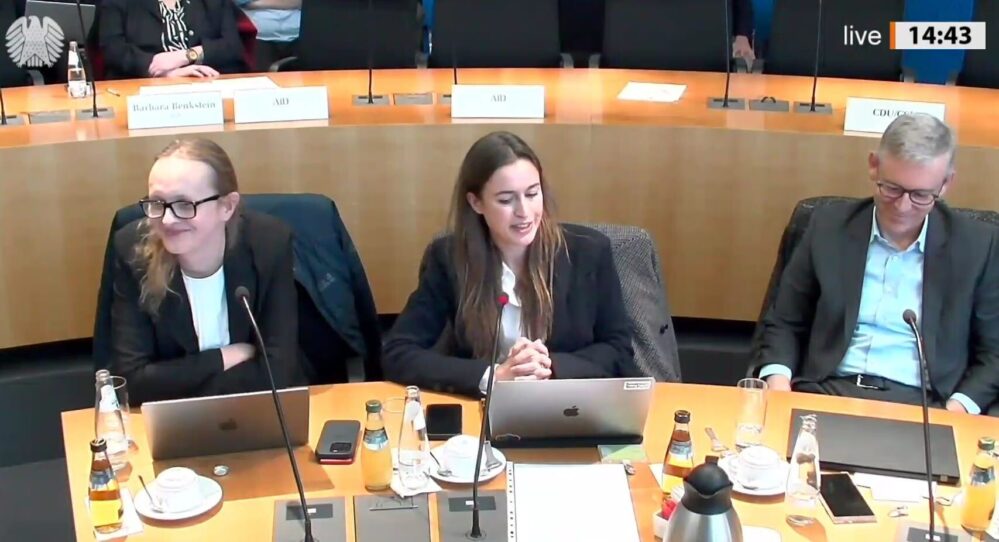
Public Hearing in the German Parliament about Open Source
By Adriana Groh
On 4 December 2024, the German parliament's digital committee convened a hearing on open source, to which Adriana Groh, CEO of the Sovereign Tech Agency, was invited to share her expert testimony and insights. Her opening statement and the full written response to the committee's questions are published here.
Thank you. In addition to the written response to the questions for the hearing (PDF, in German), I would like to summarize and emphasize three important points.
- Open source software components serve as digital infrastructure for our modern way of living and are just as indispensable for our society as physical infrastructure.
- Open source has established itself as the most successful approach to software development. It is not a matter of preference, but the de facto foundation for the use and design of practically all software.
- It is in our collective interest as a society to maintain and strengthen the open source ecosystem. To do this, we need the right tools and processes.
I will go into the individual points in more detail:
Open source software components are digital infrastructure
To illustrate the importance of open source software as digital infrastructure, I'd like to offer a simple comparison: open digital infrastructure can be thought of as the roads and bridges of the digital world. Just as physical infrastructure connects our cities, drives our economy and supports our daily lives, digital infrastructure enables the smooth flow of information and services that support government, commerce and the common good.
While we are accustomed to the need to maintain physical infrastructure, there is often a lack of awareness of the same need for digital infrastructure. Just as roads and bridges require continuous care – in the form of new pavement or protection against wear and tear, for example – digital software infrastructure also needs constant maintenance. Although maintenance may not make headlines, it is essential. Without it, cracks appear, vulnerabilities spread, and the systems we depend on can break down.
The open source ecosystem grapples with this very challenge. It is a global commons sustained by a diverse community of contributors. Open source is much more than just a question of licensing – it embodies a philosophy of collaboration, participation, and openness. It is not just about making software available to others, it is also about creating software together. Open digital infrastructure, based on open source software, thrives in a collaborative and participatory ecosystem. This approach fosters innovation, competition, and sustainability by incorporating contributions from various parties and emphasizing shared responsibility and collective benefit. However, many of the most important components rest on fragile foundations. Extensively used software libraries, developer tools, and frameworks that support both public and private digital systems are often maintained by small, underfunded teams or individual volunteers. This structural weakness poses systemic risks. A single vulnerability in a central component can spread through interconnected systems, endangering security and functionality.
Open source: a successful strategy
No new piece of software, no new technological innovation, starts from scratch. The advantages of open source software – shorter innovation cycles, better reusability, more sustainability, and greater security – have led to open source software becoming the basis of our modern way of life and being used everywhere. But open source is more than a technical or economic decision – it is a strategic one. Open source embodies the principles of transparency, collaboration, and independence. These values are closely linked to democracy and sovereignty. By reducing dependency on individual entities and strengthening participation and diversity, open source makes it possible to maintain control over our digital infrastructure, reduce economic and geopolitical risks, and promote innovation tailored to individual and societal needs.
If we understand open source as more than just a question of licensing and build up commensurate resources and skills, we can unleash a wide range of positive effects. Open source can then be understood as a guiding principle - an open source spirit, in a manner of speaking. In this way, we are not just using technology, we are transferring the collaborative, innovative, and sustainable processes from open source software development to the way we work together as a whole, opening up completely new possibilities.
Open source is not just a collection of tools or isolated software solutions; it is a public good and a powerful political lever. By prioritizing sustainable financing and strategic investment in the people, projects, and communities behind our digital infrastructure, we can create a secure, resilient and innovative foundation for our digital future.
The open source ecosystem serves the common interest
We need to adopt a holistic approach to addressing the structural risks, major opportunities, and the realities of open source software as digital infrastructure.
One of our short-term goals is to develop targeted support measures for the open source ecosystem. This involves securing critical existing foundational technologies in the public interest and ensuring that they remain sound foundations for businesses and public administrations to build upon. However, it is also important to prepare for future challenges, such as the transition to post-quantum cryptography – a complex, long-term change in which open source solutions will play a key role.
In the medium term, we need to address structural weaknesses in the ecosystem. Today's open source maintenance is often ad hoc, reliant on volunteers and, in many cases, unsustainable. To mitigate these problems, we need a portfolio of complementary instruments to, for example, increase diversity and attract and develop the next generation, develop sustainable governance structures, and build structures and open source strategies in and between government, business, and society.
In the long term, we need to recognize and support the open source ecosystem as digital infrastructure in the same way we do physical infrastructure. We need to understand and ensure digital public services as the provision of digital services in the public interest. By demonstrating the value of investment in infrastructure and maintenance – not just in new innovation – we can create a strong, well-funded and secure open source ecosystem that serves the public good.
Our vision is clear
A resilient and open digital infrastructure in the public interest. To achieve this, our mission is to build the public institutions and additional structures necessary to maintain and strengthen this foundation over the long run. I am happy to be here today with colleagues from the Center for Digital Sovereignty in the Public Administration (ZenDiS), the Open Source Business Alliance and the Free Software Foundation Europe, who are working with their organizations to help make this vision a reality.
Watch the full hearing
The German parliament has provided the full recording of the hearing on open source, which is embedded below. The video is available in German language with German captions.
Recording of the public hearing about open source on 4 December 2024 in the digital committee of the German Bundestag.


